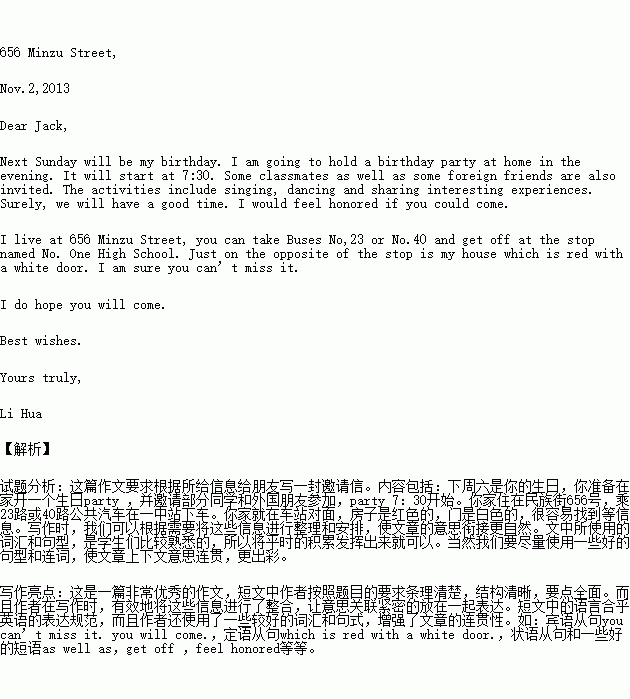ΧβΡΩΡΎ»ί
ιΟφ±μ¥ο
ΦΌΕ®Ρψ «άνΜΣΘ§œ¬÷ήΝυ «ΡψΒΡ…ζ»’Θ§ΡψΉΦ±Η‘ΎΦ“ΩΣ“ΜΗω…ζ»’party Θ§≤Δ―ϊ«κ≤ΩΖ÷Ά§―ßΚΆΆβΙζ≈σ”―≤ΈΦ”Θ§party 7ΘΚ30ΩΣ ΦΓΘΡψΦ“ΉΓ‘ΎΟώΉεΫ÷656Κ≈Θ§≥Υ23¬ΖΜρ40¬ΖΙΪΙ≤Τϊ≥Β‘Ύ“Μ÷–’Ψœ¬≥ΒΓΘΡψΦ“ΨΆ‘Ύ≥Β’ΨΕ‘ΟφΘ§ΖΩΉ” «Κλ…ΪΒΡΘ§Ο≈ «ΑΉ…ΪΒΡΘ§Κή»ί“Ή’“ΒΫΓΘ«κΗυΨίΚΟ”―–≈œΔΘ§ΗχΡψΒΡ≈σ”―–¥“ΜΖβ―ϊ«κ–≈ΓΘ
ΉΔ“βΘΚ≤ΜΒΟ–¥≥ω’φ ΒΑύΦΕΚΆ–’ΟϊΘΜΩ…“‘ Β±‘ωΦ”«ιΫΎΘ§ Ι––ΈΡΝ§ΙαΘΜ¥ ΐ100Ήσ”“Θ§Ηχ≥ωΒΡΩΣΆΖΚΆΫαΈ≤≤ΜΦΤ»κΉή¥ ΐΓΘ
656 Minzu Street
November 2, 2015
Dear Jack,
Next Saturday will be my birthday. ______________________________
______________________________________________________________________________
______________________________________________________________________________
______________________________________________________________________________
Best wishes,
Yours truly,
Li Hua
 ΧλΧλœρ…œ“Μ±ΨΚΟΨμœΒΝ–¥πΑΗ
ΧλΧλœρ…œ“Μ±ΨΚΟΨμœΒΝ–¥πΑΗ –Γ―ß…ζ10Ζ÷÷””Π”ΟΧβœΒΝ–¥πΑΗ
–Γ―ß…ζ10Ζ÷÷””Π”ΟΧβœΒΝ–¥πΑΗ

 y mean .
y mean .